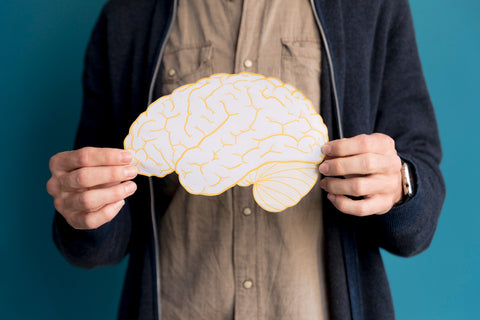The brain requires many different nutrients to function properly. Nutritional deficiencies can contribute to the development of psychiatric disorders, age-related cognitive decline and developmental disorders (7).
Cognitive function can decline if we consume diets rich in saturated fats, high calories and high sugar content.
In order to support brain health, it is important to consume a balanced diet that is rich in vitamins, minerals, omega-3 fatty acids and antioxidants. Additionally, certain supplements, nootropics and adaptogens have been shown to have positive effects on cognitive function and mental health.
Nootropics are substances that can improve cognitive function, such as omega-3 fatty acids and Gingko Biloba.
Adaptogens are herbs, such as ashwagandha and Rhodiola, which can help to reduce stress and improve cognitive performance. Supplements, such as B vitamins, vitamin D and magnesium, have also been shown to support cognitive function and help to reduce the risk of cognitive decline.
Nootropics and adaptogens can help improve memory, thinking speed and attention.
They can alter the levels of certain neurotransmitters (such as adrenaline, dopamine serotonin and GABA), enzymes or hormones in the brain. Other functions include promoting blood flow and protecting the cells from damage caused by oxidative stress. This affects motivation, focus and alertness.
Other benefits involve enhancing learning, improving processing, increasing willpower, enhancing cellular membrane fluidity and aiding mental performance (2).
If you take any nootropics, you should also attempt to manage stress, get adequate sleep, eat a balanced diet, stay physically active, routinely challenge your mind and avoid smoking (5).
Natural brain-boosting foods include salmon, cocoa, avocado, beetroot, blueberries, bone broth, broccoli, eggs, organ meats, olive oil, leafy greens and turmeric (2).

1. Omega 3 fatty acids
Omega 3 is found in fish, shellfish and plant sources such as walnuts, chia seeds and flaxseeds. They are important for heart and brain health (1).
Omega 3 can alter signalling events, which positively influences synaptic function (9).
DHA is an essential building block of the brain. They are thought to support memory, reaction time and minimise inflammation (2, 6). Whereas EPA is associated with an improvement in mood (5).
Omega-3 contains two fatty acids EPA and DHA which contribute to the maintenance of normal brain and heart function, normal vision, blood pressure and triglyceride levels.
One study found that DHA levels correlated directly with the degree of change in Alzheimer's disease and inflammatory markers in the brain and spine fluid. This is because DHA is able to cross the blood-brain barrier (4).
If you do not consume two portions of oily fish per week, then an Omega 3 supplement may be beneficial for you. 1000mg per day of fish oil is recommended (5).
2. B Vitamins
Scientific studies investigating the effect of B Vitamins on brain health have mainly focused on Vitamin B6, B9 and B12. Deficiency in B Vitamins is common, even in developed countries as they have been linked to negative health consequences such as impaired brain function (6).
Thiamine is found abundantly in the brain and nerve tissue. A deficiency in B1 can lead to Korsakoff syndrome, a chronic memory disorder.
Folic acid plays an important role in the synthesis of amino acids and the formation of nerve tissue. Deficiency of B9 is associated with developmental issues in children (7).
Douaud et al concluded that B-vitamin supplementation can slow the atrophy of specific brain regions that are a key component of the Alzheimer's Disease process, associated with cognitive decline (10).
You should take B Complex vitamins as they include the correct amount of each B vitamin, which is most beneficial for your body.
3. Antioxidants
Dietary antioxidants may help provide benefits against cognitive decline resulting from ageing. This is because antioxidants can help reverse the build-up of reactive oxygen species in the brain (6).
Examples of antioxidant supplements include Vitamin C and Vitamin E.
One study concluded that Vitamin E can slow the rate of decline in those who already have dementia (1).
The highest concentration of Vitamin C is found in the brain (the pituitary gland). Vitamin C is also important in the synthesis of dopamine, a neurotransmitter. Vitamin C is water soluble (unlike Vitamin E which is fat soluble) so, excess cannot be stored in the body therefore, it is important to get adequate amounts every day (7).
Sim et al found that Vitamin C supplementation effectively increased motivation, attention, focus and contributed to better performance on cognitive tasks (11).
4. Ginkgo Biloba
Ginkgo is very popular for cognitive health (1, 8), perceptual and motor functions (2). It is mostly known for its anti-inflammatory, antioxidant, platelet forming and circulation boosting effects.
Ginkgo Biloba has been linked to reducing symptoms of ADHD and dementia (1).
However, studies show mixed results and conclusions (5,9).
A study found that after Gingko Biloba administration, possible improvements in ADHD core symptoms were found (12).
5. Ashwagandha
Ashwagandha is considered a stress reliever. Therefore, it can minimise stress-related poor cognition and memory, degeneration of the nervous system, especially the neurons in the brain, inflammation and impairment of the adrenal glands (2).
Research shows it may have beneficial effects on those with Alzheimer's disease (8).
Research found that supplementation of Ashwagandha showed significant improvement in immediate and general memory, executive function, attention, and information processing speed, compared to the placebo group (13).
6. Ginseng
Ginseng is a strong adaptogen that has been shown to successfully improve memory and calmness. Some scientists believe that it has anti-stress properties and can be used to improve mood and mental performance (2). Ginseng for Less Stress and Better Brain Function | HealthAid
After Korean Ginseng supplementation, the grey matter volume increased significantly in the treatment group, relative to the placebo group. They also showed a greater magnitude of enhancement in the composite cognitive scores, which could be associated with cognitive enhancement (14).
Reay et al found that 200 milligrams of ginseng for eight days can slow the fall in mood and 400 milligrams of ginseng can improve calmness and mental arithmetic.
7. Other Vitamins
Other Vitamins to consider include Vitamin A, Zinc and Vitamin D as they contribute to the protection of cells from oxidative stress. Vitamin D contributes to normal protein synthesis and muscle function (the brain is a muscle) (1).
They are commonly used in Multivitamin/mineral “brain formulas”.
A significant decrease in depressive inventory (a scale used to measure depression) was found among those who received zinc, vitamin D, or joint zinc-vitamin D supplements, compared with the placebo group (15).
BrainVit contains Vitamin C, E, A, B Vitamins, Zinc, Ginkgo Biloba and many other brain-boosting ingredients.
Other Factors
There are many other factors that can affect your cognitive health. We should try to implement healthy lifestyle factors and choices rather than relying solely on vitamins.
For example, a diet rich in healthy fats and oils and colourful foods will protect and benefit the brain, as colourful foods are high in natural antioxidants. Please read our blog article for more information Food For The Brain | HealthAid
Too much alcohol can increase the risk of cognitive decline.
Regular physical activity has a strong association with reducing the occurrence of cognitive decline.
Lack of sleep can also affect your cognitive health, so make sure you get the correct amount of sleep (7-9 hours).
Furthermore, long-term, untreated health problems such as Type 2 diabetes and high blood pressure can increase your chances of developing dementia (1).
Side effects
Although nootropic supplements and adaptogens are natural vitamins and herbs, some individuals may have a reaction.
If you develop a tolerance to your chosen Vitamin, have symptoms of withdrawal when taking a break, develop brain fog, hyperactivity, anxiety or trouble sleeping when not taking the Vitamin, discontinue use and consult your doctor (2).
Sources
- https://health.clevelandclinic.org/do-brain-supplements-work/
- Best Nootropics or "Smart Drugs" and Which to Avoid - Dr. Axe (draxe.com)
- Food supplements may improve brain health among young children in low income countries: Findings could have important implications for children's education and national development, say researchers -- ScienceDaily
- Omega-3 dietary supplements pass blood-brain barrier -- ScienceDaily
- 5 Best Brain-Boosting Supplements, According to Experts (healthline.com)
- Supplements for the brain: What to know (medicalnewstoday.com)
- 6 Vitamins And Minerals That Boost Brain Power (medicaldaily.com)
- Herbs and Supplements for Brain Health - Food For Thought (foodforthoughtuk.com)
- Nutritional Supplements and the Brain in: International Journal of Sport Nutrition and Exercise Metabolism Volume 28 Issue 2 (2018) (humankinetics.com)
- Preventing Alzheimer's disease-related gray matter atrophy by B-vitamin treatment - PubMed (nih.gov)
- Vitamin C supplementation promotes mental vitality in healthy young adults: results from a cross-sectional analysis and a randomized, double-blind, placebo-controlled trial - PubMed (nih.gov)
- Ginkgo biloba extract EGb 761® in children with ADHD - PubMed (nih.gov)
- Efficacy and Safety of Ashwagandha (Withania somnifera (L.) Dunal) Root Extract in Improving Memory and Cognitive Functions - PubMed (nih.gov)
- Effects of Korean red ginseng on human gray matter volume and cognitive function: A voxel-based morphometry study - PubMed (nih.gov)
- Effects of zinc, vitamin D, and their co-supplementation on mood, serum cortisol, and brain-derived neurotrophic factor in patients with obesity and mild to moderate depressive symptoms: A phase II, 12-wk, 2 × 2 factorial design, double-blind, randomized, placebo-controlled trial - PubMed (nih.gov)
Images: Image by Freepik Image by rawpixel.com on Freepik
Any information or product suggested on this website is not intended to diagnose, treat, cure, or prevent any medical condition. Never disregard medical advice or delay in seeking it because of something you have read on this website. Consult your primary healthcare physician before using any supplements or making any changes to your regime.





